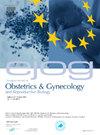Caesarean section scar: Histological analysis on hysterectomy specimen. A pilot study
IF 2.1
4区 医学
Q2 OBSTETRICS & GYNECOLOGY
European journal of obstetrics, gynecology, and reproductive biology
Pub Date : 2024-11-01
DOI:10.1016/j.ejogrb.2024.10.048
引用次数: 0
Abstract
Introduction
In recent years, caesarean section (CS) rate has risen worldwide. Complications associated with CS scars have risen too, such as scar dehiscences and uterine ruptures. Uterine healing is a complex phenomenon still poorly understood. The aim of this study is to carry out a comparative histological analysis of healthy and scarred uterus.
Material and methods
Women who underwent hysterectomy for benign pathology were included prospectively and divided into two groups: previous CS (group 1) versus control (group 2). Hysterectomy specimen were analyzed histologically and immunohistochemically.
Results
Sixty women were included: 30 women per group. In group 1, only 19 women could be analyzed. Median total thickness at the thinnest site of the scar is significantly thinner (4.34 mm; IQR [2.76–9.45]) than that of adjacent healthy isthmus (12.70 mm; IQR [10.45–14.95]) (p < 0.001). It is also thinner than in group 2 (13.45 mm; IQR [11.03–16.90]) (p < 0.001). Median myometrial thickness within the scar in group 1 was also thinner (1.14 mm; IQR [0.30–2.69]) than that of the adjacent healthy isthmus (8.90 mm; IQR [8.18–10.08]) (p < 0.001) and that in group 2 (10.00 mm; IQR [8.38–13.35]) (p < 0.001). There was a significant increase in fibrosis in the scar (55.01 %; IQR [35.71–63.46]) compared with adjacent tissue (17.41 %; IQR [15.08–24.78]) (p < 0.001) and with healthy uterus (33.91 %; IQR [18.93–46.53]) (p = 0.006).
Conclusion
In uterus with previous CS scar, total thickness of the wall and thickness of the myometrium are reduced and proportion of fibrosis is significantly increased. This study shows that the thickness of the wall remains reduced in scarred uterus, even very long after CS. Further studies are currently in progress to understand its pathophysiology within the uterus using animal models.
剖腹产疤痕:子宫切除术标本的组织学分析。试点研究
导言近年来,剖腹产(CS)率在全球范围内不断上升。与剖腹产疤痕相关的并发症也在增加,如疤痕裂开和子宫破裂。子宫愈合是一个复杂的现象,人们对它的了解还很少。本研究旨在对健康子宫和疤痕子宫进行组织学对比分析。材料和方法前瞻性地纳入了因良性病变而接受子宫切除术的女性,并将其分为两组:既往 CS(第 1 组)和对照组(第 2 组)。对子宫切除标本进行组织学和免疫组化分析:每组 30 人。在第 1 组中,只有 19 名妇女可以进行分析。疤痕最薄处的中位总厚度(4.34 毫米;IQR [2.76-9.45])明显薄于邻近的健康峡部(12.70 毫米;IQR [10.45-14.95])(p <0.001)。它也比第 2 组(13.45 毫米;IQR [11.03-16.90])薄(p <0.001)。与邻近健康峡部(8.90 毫米;IQR [8.18-10.08])(p <0.001)和第 2 组(10.00 毫米;IQR [8.38-13.35])(p <0.001)相比,第 1 组瘢痕内子宫肌层厚度中值(1.14 毫米;IQR [0.30-2.69])也较薄。与邻近组织(17.41%;IQR [15.08-24.78])(p < 0.001)和健康子宫(33.91%;IQR [18.93-46.53])(p = 0.006)相比,瘢痕处的纤维化程度明显增加(55.01%;IQR [35.71-63.46])。这项研究表明,即使在 CS 后很长时间,瘢痕子宫壁的厚度仍然会减少。目前正在利用动物模型开展进一步研究,以了解其在子宫内的病理生理学。
本文章由计算机程序翻译,如有差异,请以英文原文为准。
求助全文
约1分钟内获得全文
求助全文
来源期刊
CiteScore
4.60
自引率
3.80%
发文量
898
审稿时长
8.3 weeks
期刊介绍:
The European Journal of Obstetrics & Gynecology and Reproductive Biology is the leading general clinical journal covering the continent. It publishes peer reviewed original research articles, as well as a wide range of news, book reviews, biographical, historical and educational articles and a lively correspondence section. Fields covered include obstetrics, prenatal diagnosis, maternal-fetal medicine, perinatology, general gynecology, gynecologic oncology, uro-gynecology, reproductive medicine, infertility, reproductive endocrinology, sexual medicine and reproductive ethics. The European Journal of Obstetrics & Gynecology and Reproductive Biology provides a forum for scientific and clinical professional communication in obstetrics and gynecology throughout Europe and the world.

 求助内容:
求助内容: 应助结果提醒方式:
应助结果提醒方式:


